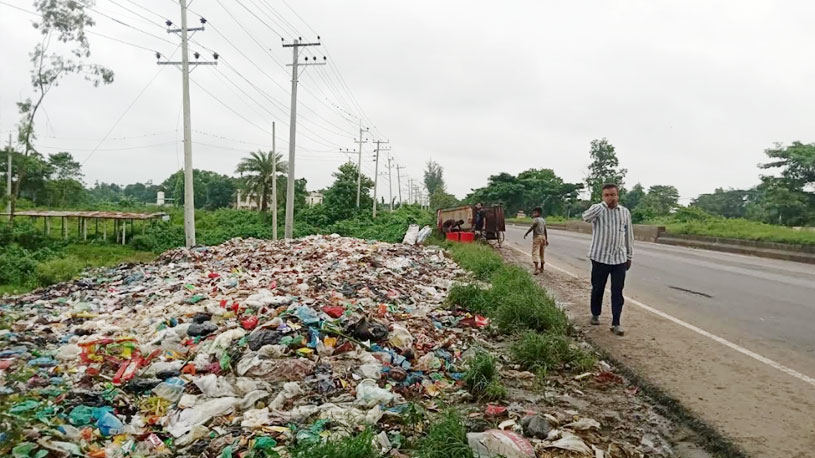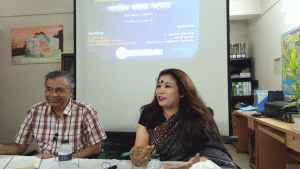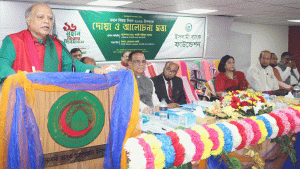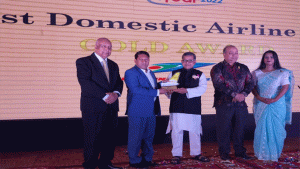
Md Emdad Ullah, Chauddagram(Cumilla) : The authorities of various municipalities and market traders leave the dividers of the Dhaka-Chittagong highway, which is the lifeline of the country’s economy, and pile up waste on both sides. More than half a hundred places on the road have become a dumping ground for dead animals, dead poultry and garbage. Due to lack of waste treatment system, public life has become miserable along with severe environmental pollution. Biodiversity under threat. There is no effective government initiative to prevent environmental pollution and protect biodiversity It is known that waste management refers to the integrated system of garbage collection, transportation, processing, recycling and disposal. Inadequacy of modern and safe waste disposal system is one of the environmental problems of Bangladesh. Bangladesh is the eighth most populous and tenth densely populated country in the world. As a result, the problem of proper waste management is increasing along with the increasing population in the country.
At present, the amount of waste generated in Bangladesh is about 22.4 million tons per year, i.e. 150 kilograms per capita. This rate is constantly increasing. If this continues, approximately 47 thousand 64 tons of waste will be generated daily in 2025. This will increase the per capita rate to 220 kilograms. Apart from this, houses, business establishments and industries have been built scattered in the process of unplanned urbanization. Most of these infrastructures do not have a modern and scientifically sound system of waste disposal. As a result, a large amount of household waste is being thrown everywhere every day from the homes of numerous people. The solid waste disposal system is also very fragile and outdated. Garbage is piled here and there by the roadside, and it rots and pollutes the air severely. The Comilla section of the highway was visited on the ground, Chouddagram, Miyabazar, Gouripur, Taltali, Madhaiya, Chandina, Nimsar, Kabila, Nishintpur, Amtali, Alekharchar, Paduarbazar, Suagazi areas of the highway and on both sides of the highway are piled up due to garbage and various types of waste. has been made In these heaps, various types of waste, including rotten vegetables and poultry droppings, are being dumped from most of the hotels and restaurants along with the wastes of various businesses, which are constantly built up like frog umbrellas on both sides of the highway. Garbage is being thrown on the pitch of the road somewhere. Animals-birds and dogs-cats are spreading the highway randomly while eating the leftovers of these wastes. These garbage on the road are crushed by the wheels of the vehicles and spread bad smell and these garbage become dust and fly in the air. In particular, garbage and toxic dust are flying in the air and falling into the surrounding houses and educational institutions.Thousands of vehicle drivers, passengers and pedestrians are suffering due to stench on the highway. The residents of the area next to the road are fed up. While walking through these places on the highway, you have to hold a handkerchief to your nose.
In a word – people’s environment and health rights are under threat. Recently research has revealed that the level of environmental pollution due to waste has increased at an alarming rate. Air and water are being polluted by industrial waste, medical waste, animal waste and various chemical wastes. It affects biodiversity. Adverse effects on the climate. Climate change is causing complex and difficult diseases of various animals. Due to the effect of climate on the environment, various complex and unfamiliar diseases including viral and bacterial, food-related diseases occur. Natural disasters have increased. Air pollution is one of the causes of this disaster around the environment. It is increasing day by day. In Bangladesh, 22 percent of people are exposed to particulate matter and 30 percent of people are affected by fuel-related pollution. Harmful greenhouse gases are methane, carbon dioxide, nitrous oxide, ozone etc. The problems that have become apparent due to the lack of proper management of livestock waste are; Ground water pollution, air pollution, biodiversity loss, global warming, sea level rise etc. Foul odors from livestock wastes have caused various health problems for humans and animals. Such as bone problems, loss of appetite etc. Excessive consumption of harmful gases can cause death to humans and animals.
It also causes acid rain. Various disease-causing microorganisms and nitrates are one of the causes of water pollution in the environment. The presence of high concentrations of nitrates in drinking water poses a threat to human and animal health. Acids, pesticides, oils and various toxic substances used in industries can destroy aquatic animals and plants. Phosphates, chemical fertilizers, detergents and manures pollute water by providing excess nutrients to aquatic animals and plants. Water pollution is constantly occurring from household waste, industrial and agricultural waste, and human and animal excrement.Excess nutrients lead to excessive growth and subsequent death of aquatic algae, as bacteria consume excessive amounts of dissolved oxygen in the water to decompose the dead algae. It causes lack of oxygen in the water. The world is concerned about the impact of man-made waste on the climate. The United Nations has taken several steps to reduce the impact of waste on the climate. Their programs are: strengthening climate-related hazards in all countries, resilience and adaptation to natural disasters, integrating climate change into national policies, strategies and plans, climate change mitigation, adaptation, mitigation and education and awareness raising, human and institutional capacity building and early Warning etc. In the developed world, there are two things going on about waste; Today’s waste is tomorrow’s resource. Garbage is cash. For example, in Sweden and Norway, waste is being processed into something usable and the business is very profitable there. Around this they are importing waste from other countries. The role of waste management is immense in preventing environmental pollution in country-place-time. If there is a failure to determine the right way, over time the environment deteriorates to an unbearable level.
Inadequate finance-technology-manpower provision in developing and underdeveloped countries makes waste management very weak-disruptive compared to the developed world. In the overall situation, like the developed countries of the world, Bangladesh should take various initiatives in waste management. Waste or waste should be stored, neutralized, neutralized or processed by the concerned organization to make various new products suitable for use. As the environment will benefit from it, the people of the country will also benefit economically. Professor Kazi Sheikh Farid of Bangladesh Agricultural University said that water and air pollution are increasing day by day due to waste mismanagement. To save biodiversity, it has become necessary to treat waste through modern management in Bangladesh like developed countries. For this, the government should take effective steps.













